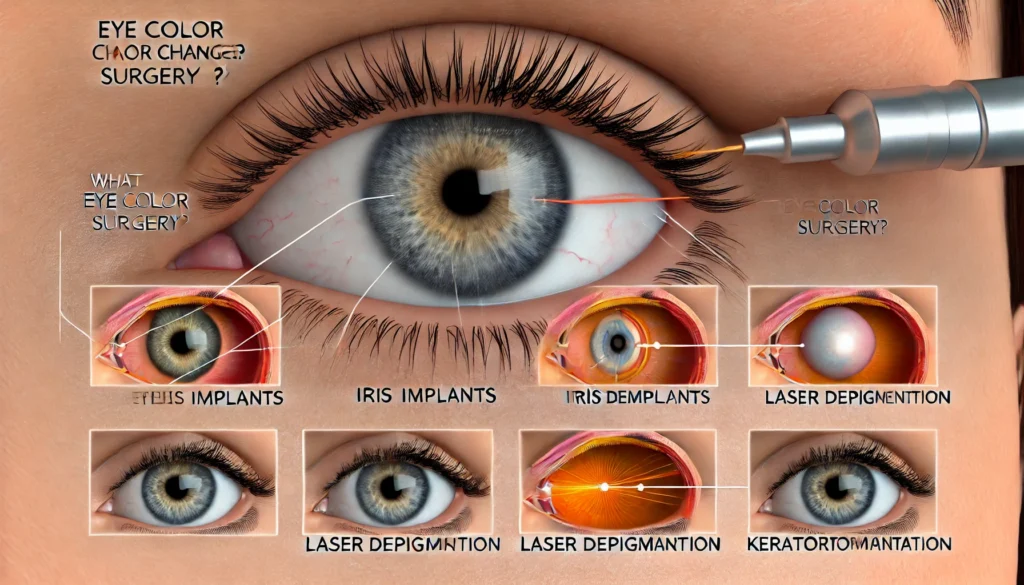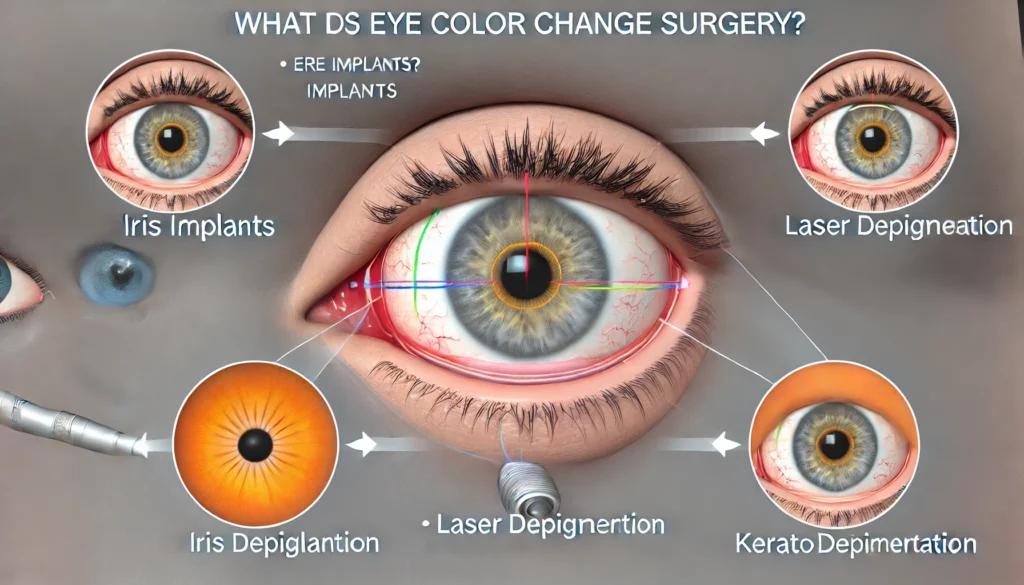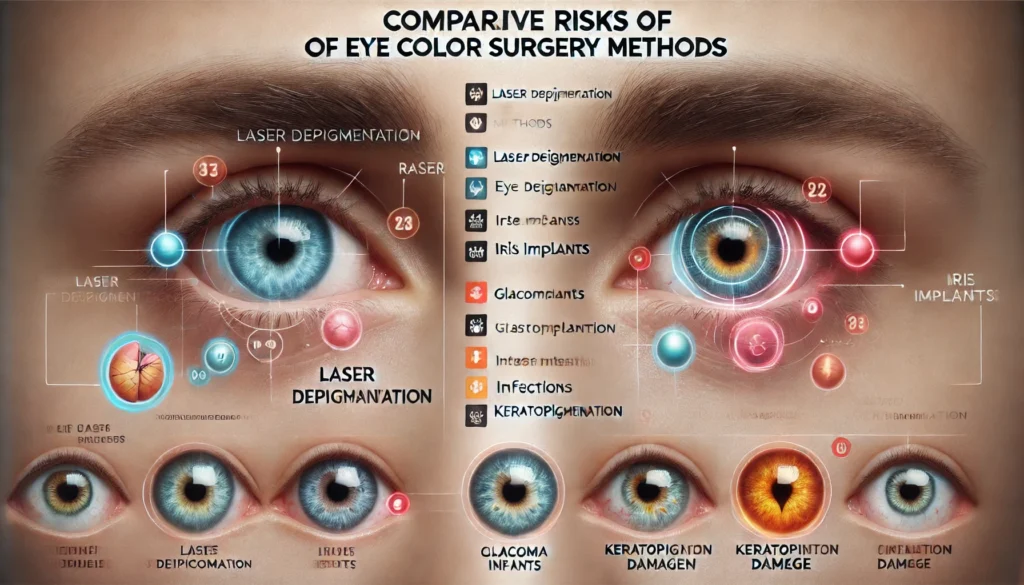Can Eye Color Surgery Affect Your Vision? A Comprehensive Guide

- What Is Eye Color Change Surgery?
- Severe Complications Affecting Vision
- Study Data
- Case Studies
- Can Eye Color Surgery Impact Vision?
- Comparative Risks of Eye Color Surgery Methods
- Can These Surgeries Cause Permanent Vision Loss?
- How to Minimize Risks and Protect Your Vision
- Conclusion: Weighing the Benefits and Risks
Introduction: Eye Color Surgery and Your Vision – What You Need to Know
Changing your eye color surgically is an exciting option for many, offering a permanent solution to achieve the look you desire. However, a major concern for most individuals considering these procedures is whether it can affect their vision. This guide will take an in-depth look at the various procedures available, their impact on eyesight, and ways to minimize risks while achieving the results you want.
What Is Eye Color Change Surgery?
Eye color change surgery refers to medical procedures designed to alter the iris permanently. Three of the most common methods are:

- Laser Eye Color Change: This technique uses lasers to break down melanin in the iris, lightening the eye color over time.
- Iris Implants: This invasive procedure involves placing a synthetic iris in the eye to alter its appearance.
- Keratopigmentation: In this method, a pigment is injected into the cornea to create the appearance of a different eye color.
Each procedure comes with potential risks and complications, and one of the primary concerns is whether these surgeries can have lasting effects on your vision.
Eye Color Change Surgery: Effects on Vision
Severe Complications Affecting Vision
Study Data
Case Studies
30-year-old man (2018)
41-year-old woman (Long-term)
Model Nadinne Bruna
Official Warnings:
🚨 American Academy of Ophthalmology warns against these procedures due to risks of eye damage, vision loss, and blindness.
🚫 FDA has not approved any eye color change procedures for cosmetic use.
Can Eye Color Surgery Impact Vision?
The risk of vision impairment varies depending on the procedure. In general, side effects can range from mild irritation to more severe complications such as permanent vision loss.

Laser Eye Color Change Side Effects
Laser eye color change is less invasive than other methods, but it still poses risks that can affect your vision.
- Increased Sensitivity to Light: After the procedure, patients often experience light sensitivity for several weeks or even months.
- Iris Inflammation: Some people may develop inflammation in the iris, leading to blurred vision or discomfort.
- Glaucoma: Removing melanin from the iris can cause pressure imbalances, increasing the risk of glaucoma, a condition that can cause irreversible vision loss if left untreated.
Statistical Insight: A study conducted in 2023 revealed that glaucoma was a major concern for patients undergoing laser depigmentation, particularly in cases where intraocular pressure was not properly monitored.
Iris Implants: What You Should Know About Risks to Vision
Iris implants are another popular option, particularly for those looking for a permanent solution. However, the risks associated with this surgery are significant.
- Corneal Damage: Implants can rub against the cornea, leading to scarring that can impair vision or cause discomfort.
- Glaucoma: The insertion of an artificial iris can increase pressure within the eye, elevating the risk of glaucoma.
- Infection: Like any invasive surgery, there is a risk of infection that could cause long-term damage, including vision loss.
Study Highlight: In a 2012 study, 64% of patients with cosmetic iris implants experienced complications, many of which resulted in the removal of the implants to prevent further vision impairment.
Keratopigmentation: Is It Safer for Your Vision?
Keratopigmentation, or the injection of pigment into the cornea, is a newer, less invasive option compared to iris implants. While it offers a somewhat safer alternative, the procedure is not without its risks.
- Blurry Vision: The uneven distribution of pigment can cause blurred vision or halos around lights.
- Corneal Scarring: If the pigment is injected incorrectly, it can cause scarring that impacts the patient’s eyesight.
- Infection Risk: Like with any surgery, there’s always the risk of infection, which could lead to permanent vision impairment.
Clinical Data: While keratopigmentation offers a less invasive approach, studies have reported common side effects such as blurry vision and sensitivity to light, with some patients requiring further surgery to correct these issues.
Comparative Risks of Eye Color Surgery Methods

To better understand the risks associated with each method, here’s a comparison of their impact on vision:
| Procedure | Impact on Vision | Risk Level | FDA Status |
|---|---|---|---|
| Laser Eye Color Change | Light sensitivity, glaucoma, iris inflammation | Moderate | Not approved |
| Iris Implants | Glaucoma, corneal damage, infection | High | Not approved |
| Keratopigmentation | Blurry vision, corneal scarring, infection | Moderate | Not approved |
Can These Surgeries Cause Permanent Vision Loss?
The risk of permanent vision loss is particularly high for procedures like iris implants, where complications such as glaucoma or corneal damage can lead to irreversible damage. Although laser surgery and keratopigmentation present less risk, both can still lead to long-term vision problems if not handled properly.

Real-World Data on Vision Loss
- Glaucoma Risk: Research indicates that up to 33% of patients undergoing iris implant surgery may experience a significant increase in intraocular pressure, potentially leading to glaucoma.
- Corneal Scarring: 25% of patients who opt for keratopigmentation report vision distortion or blurry vision due to corneal scarring.
How to Minimize Risks and Protect Your Vision
If you're considering any type of eye color surgery, follow these steps to minimize the risks:

- Consult a Certified Ophthalmologist: Ensure your doctor is highly experienced and qualified for the procedure you're considering.
- Comprehensive Pre-Surgery Testing: A thorough eye exam is critical to detect pre-existing conditions that could increase the risk of complications.
- Follow Post-Surgery Care: Post-operative instructions, such as using medicated eye drops and avoiding exposure to bright light, are essential for recovery.
- Regular Check-Ups: Regular follow-up visits to monitor your vision health can prevent complications from worsening.
- Explore Non-Surgical Alternatives: Colored contact lenses offer a non-invasive, low-risk way to change your eye color without surgery.
Conclusion: Weighing the Benefits and Risks
While eye color change surgery offers an exciting opportunity for permanent aesthetic transformation, it comes with a number of risks that can impact your vision. Whether you're considering laser eye color change, iris implants, or keratopigmentation, it's important to weigh the potential for vision impairment against the cosmetic benefits.
If you do decide to pursue surgery, consult a qualified ophthalmologist and ensure you're fully informed of the risks.
At Eye Color Change, we provide the most accurate information to help you make the best decision. Explore our resources for more insights, or contact us to get personalized advice.
Here are some real data you requested to enrich the article:
Complications from Eye Color Surgery:
- Glaucoma: A major risk that can develop due to increased intraocular pressure.
- Uveitis: Inflammation of the eye, which can result in blurry vision or discomfort.
- Corneal Edema: Swelling of the cornea that impacts vision clarity.
- Vision Loss and Blindness: While rare, these are extreme potential outcomes.
Study Example: A 2012 study reported that between 36% to 64% of patients with cosmetic iris implants developed serious vision complications. Another case study in 2018 showed that a 30-year-old man experienced progressive vision loss due to glaucoma and corneal edema following iris implants.
Case of Severe Vision Loss: Nadinne Bruna, a model, lost 80% of her vision in one eye and 50% in the other following cosmetic iris implant surgery .
Warnings from Official Bodies:
- The American Academy of Ophthalmology strongly advises against these procedures due to potential risks like ocular damage, vision loss, and blindness .
- The FDA has not approved any cosmetic eye color change surgeries .

Leave a Reply